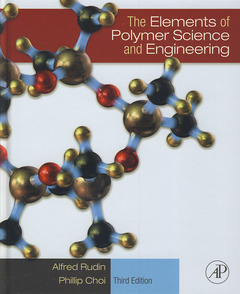Description
The Elements of Polymer Science and Engineering (3rd Ed.)
An Introductory Text and Reference for Engineers and Chemists
Authors: Rudin Alfred, Choi Phillip
Language: English
Subjects for The Elements of Polymer Science and Engineering:
Approximative price 96.04 €
In Print (Delivery period: 14 days).
Add to cart640 p. · 19x23.4 cm · Hardback
Description
/li>Contents
/li>Readership
/li>Biography
/li>Comment
/li>
Whether you are an upper or graduate level student studying polymer science and engineering or an engineer new to the field of polymers, you'll benefit from reading The Elements of Polymer Science and Engineering 3e. Since the publication of the second edition in 1999, the field of polymers has advanced considerably. A key feature of the third edition is the inclusion of new concepts in existing chapters as well as new chapters covering selected contemporary topics such as behavior of natural polymers, polymer nanocomposites, and use of polymers in nanotechnology. There are also several enhancements to the book’s pedagogy, including the addition of numerous worked examples and new figures to better illustrate key concepts and the addition of a large number of end-of-chapter exercises, many of which are based on recently published research and relevant industrial data.
- Focuses on applications of polymer chemistry, engineering, and technology
- Explains terminology, applications, and versatility of synthetic polymers
- Connects polymerization chemistry with engineering applications
- Contains practical lead-ins to emulsion polymerization, viscoelasticity, and polymer rheology
Basic Principles of Polymer Molecular Weights
Practical Aspects of Molecular Weight Measurements
Mechanical Properties of Polymer Solids and Liquids
Polymer Mixtures
Diffusion in Polymers
Step-Growth Polymerizations
Free Radical Polymerization
Copolymerization
Dispersion and Emulsion Polymerizations
Ionic and Coordinated Polymerizations
Polymer Reaction Engineering
Biopolymers
Primary: Advanced undergraduate and graduate students in chemical engineering, polymer engineering and materials science departments who are taking courses related to polymer science and engineering. Secondary: Practicing engineers new to polymer science and technology.
Prof. Phillip Choi received his B.A.Sc. in chemical engineering in 1988 from the University of British Columbia and his M.A.Sc. and Ph.D., also in chemical engineering, in 1992 and 1995, respectively, from the University of Waterloo. While pursuing his graduate studies, he received scholarships from the Federation of Societies for Coatings Technology and the Natural Sciences and Engineering Research Council of Canada to study solubility properties of non-ionic surfactants and polyolefin blends under the guidance of Professor Alfred Rudin and Dr. Tom Kavassalis of Xerox Corporation, currently VP - Strategy Planning.
Upon completion of his Ph.D., Prof. Choi worked in the coating industry as a development chemist developing high solids urethane and water-borne epoxy coating formulations. He then joined the Department of Chemical and Materials Engineering at the University of Alberta as a sessional instructor in 1996 and at the same time, carried out research in the area of polymer rheology in Prof. Michael Williams’ lab. In 1997, he became an assistant professor and was promoted to the rank of full professor in 2006. In the 2003/2004 academic year, Prof. Choi spent a one year sabbatical in Prof. Wayne L. Mattice’s lab of the Maurice Morton Institute of Polymer Science at the University of Akron studying crystallization behavior of polypropylene blends using the rotational isomeric state theory. Prof. Choi has supervised 9 postdoctoral fellows as well as 6 Ph
- Focuses on applications of polymer chemistry, engineering, and technology
- Explains terminology, applications, and versatility of synthetic polymers
- Connects polymerization chemistry with engineering applications
- Contains practical lead-ins to emulsion polymerization, viscoelasticity, and polymer rheology




